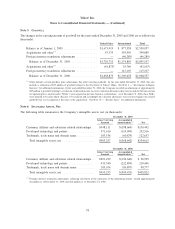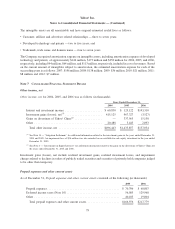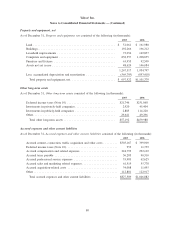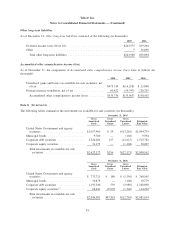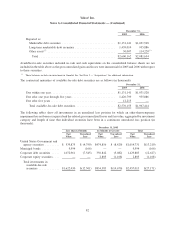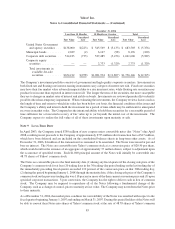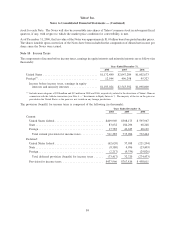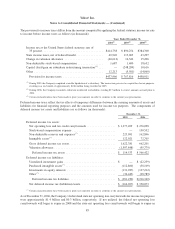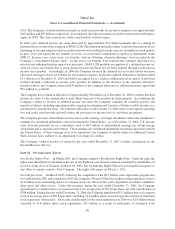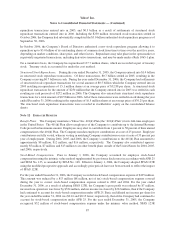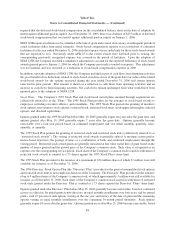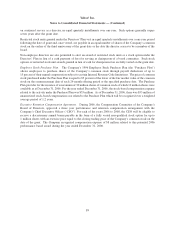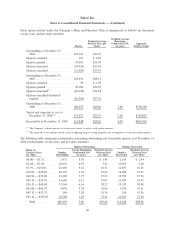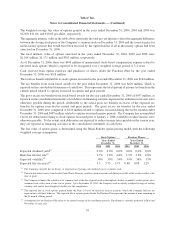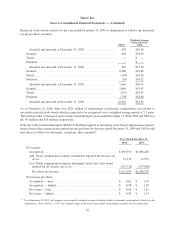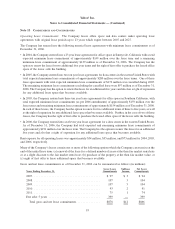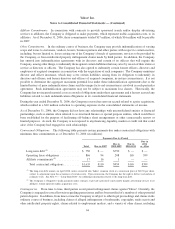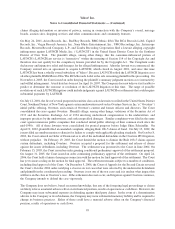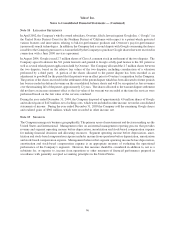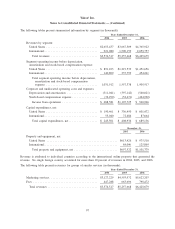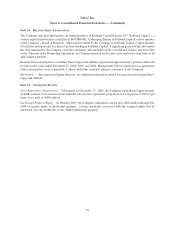Yahoo 2006 Annual Report Download - page 98
Download and view the complete annual report
Please find page 98 of the 2006 Yahoo annual report below. You can navigate through the pages in the report by either clicking on the pages listed below, or by using the keyword search tool below to find specific information within the annual report.required that the deferred stock-based compensation on the consolidated balance sheet on the date of adoption be
netted against additional paid-in capital. As of December 31, 2005, there was a balance of $235 million of deferred
stock-based compensation that was netted against additional paid-in capital on January 1, 2006.
SFAS 123R requires forfeitures to be estimated at the time of grant and revised, if necessary, in subsequent periods if
actual forfeitures differ from initial estimates. Stock-based compensation expense was recorded net of estimated
forfeitures for the year ended December 31, 2006 such that expense was recorded only for those stock-based awards
that are expected to vest. Previously under APB 25 to the extent awards were forfeited prior to vesting, the
corresponding previously recognized expense was reversed in the period of forfeiture. Upon the adoption of
SFAS 123R, the Company recorded a cumulative adjustment to account for the expected forfeitures of stock-based
awards granted prior to January 1, 2006 for which the Company previously recorded an expense. This adjustment
was not material and was recorded as a reduction to stock-based compensation expense in 2006.
In addition, upon the adoption of SFAS 123R, the Company included as part of cash flows from financing activities
the gross benefit of tax deductions related to stock-based awards in excess of the grant date fair value of the related
stock-based awards for the options exercised during the year ended December 31, 2006 and certain options
exercised in prior periods. This amount is shown as a reduction to cash flows from operating activities and an
increase to cash flows from financing activities. Net cash flows remain unchanged from what would have been
reported prior to the adoption of SFAS 123R.
Stock Plans. The Company’s 1995 Stock Plan and stock-based award plans assumed through acquisitions are
collectively referred to as the “Plans.” The 1995 Stock Plan provides for the issuance of stock-based awards to
employees, including executive officers, and consultants. The 1995 Stock Plan permits the granting of incentive
stock options, non-statutory stock options, restricted stock, restricted stock units, stock appreciation rights, indexed
options, and dividend equivalents.
Options granted under the 1995 Stock Plan before May 19, 2005 generally expire ten years after the grant date, and
options granted after May 19, 2005 generally expire 7 years after the grant date. Options generally become
exercisable over a four-year period based on continued employment and vest either monthly, quarterly, semi-
annually, or annually.
The 1995 Stock Plan permits the granting of restricted stock and restricted stock units (collectively referred to as
“restricted stock awards”). The vesting of restricted stock awards is generally subject to meeting certain perfor-
mance-based objectives, the passage of time, or a combination of both, and continued employment through the
vesting period. Restricted stock award grants are generally measured at fair value on the date of grant based on the
number of shares granted and the quoted price of the Company’s common stock. Such value is recognized as an
expense over the corresponding service period. Each share of the Company’s common stock issued in settlement of
restricted stock awards is counted as 1.75 shares against the 1995 Stock Plan’s share limit.
The 1995 Stock Plan provides for the issuance of a maximum of 654 million shares of which 51 million were still
available for issuance as of December 31, 2006.
The 1996 Directors’ Stock Option Plan (the “Directors’ Plan”) provides for the grant of nonqualified stock options
and restricted stock units to non-employee directors of the Company. The Directors’ Plan provides for the issuance
of up to 9 million shares of the Company’s common stock, of which approximately 5 million were still available for
issuance as of December 31, 2006. Each share of the Company’s common stock issued in settlement of restricted
stock units granted under the Directors’ Plan is counted as 1.75 shares against the Directors’ Plans’ share limit.
Options granted under the Directors’ Plan before May 25, 2006 generally become exercisable, based on continued
service as a director, for initial grants to new directors, in equal monthly installments over four years, and for annual
grants, with 25 percent of such options vesting on the one year anniversary of the date of grant and the remaining
options vesting in equal monthly installments over the remaining 36-month period thereafter. Such options
generally expire 10 years after the grant date. Options granted on or after May 25, 2006 become exercisable, based
88
Yahoo! Inc.
Notes to Consolidated Financial Statements — (Continued)


